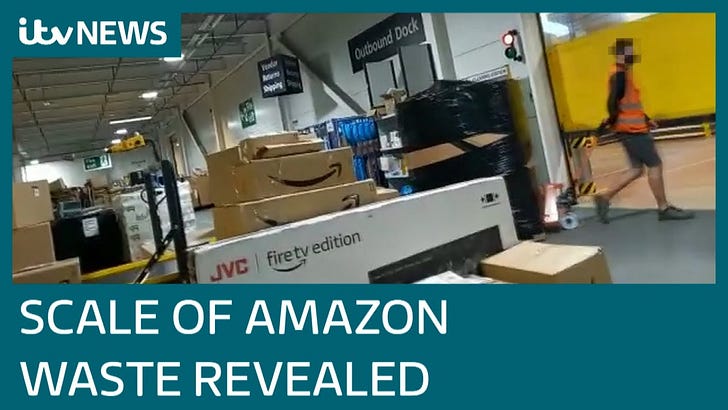Why reaching net-zero is like buying an electric vehicle? How Amazon broke my heart!
The top three things you need to know about net-zero ambitions and beyond
I think I’ll start with Amazon because I cannot seem to get over the fact that a new investigation revealed that Amazon is destroying millions of items of unsold stock every year, products that are often new and unused. And I mean we are talking about Dyson fans, Hoovers, the occasional MacBook, and iPad; and even Covid (face) masks still in their wrappers. If you are disappointed to hear this news, leave a comment please so I know I am not all on my own.
Putting aside all my feelings about “Amazon vs local economy” and “the occasional news about what happens in their supply chains”, we are all at the mercy of this super efficient "order now, at your door in a few hours” paradigm. Sending perfectly good products to landfill! Seriously Amazon! What happened to the Amazon Second Chance!, an initiative that mighty Amazon offers a second life to products!)
Let’s take a small peek at why “Amazon’s throwing away perfectly good-conditioned electric products” is a problem. I am a big fan of the circular economy business model, which advocates for reusing resources and designing out waste and pollution, keeping products and materials in use, and regenerating natural systems.
The Ellen MacArthur Foundation’s electric waste report reveals the magnitude of the problem (This is referring to end-of-life of products, not products in perfectly good condition being thrown away!)
The electronic waste problem is colossal, and it’s growing. In 2016 alone, 44.7 million tonnes of e-waste were generated globally, of which 435 thousand tonnes were mobile phones, representing more than the mass of the Empire State Building. Just 20% of e-waste is documented to be collected and recycled under appropriate conditions, while the remaining 80% is either thrown into the residual waste stream or dumped, traded or treated in substandard conditions. The consequences of this linear electronics system pose environmental and health impacts both at the production and disposal ends.
A circular economy offers efficient use of resources by keeping them in the system and creating value for the economy. I would like to believe Amazon could drive value from unwanted items in good conditions.
What is “Carbon Neutral or “Net Zero”?
Yesterday, as I was walking down the street with my 9-year-old, she pointed to an advertisement that claims a certain food company is now “carbon neutral”. And of course, my very inquisitive 9-year-old then asked, “What does it mean to be carbon neutral?”
Does anyone exactly know what phrases like “Net Zero” or “Carbon Neutral” mean? I don’t mean this question in any cynical manner. Because these things mean different things to different companies and industries.
It is true that to keep global warming to 1.5 degrees Celsius, WE (corporations, governments, individuals) must reach net-zero carbon dioxide emissions globally by 2050. Action is expected from companies and governments! (See this about G7’s Net Zero efforts, or lack there of)
We need to measure what we need to change! This is the first complicated part as measurement metrics are still not unified. Comparing an oil giant to a food company is like comparing apples to oranges. Furthermore, it is hard to grasp what is really pledged because frankly, pledges are not concrete actions in the wake of a climate crisis, that requires immediacy and robustness.
When Shell claims “Net Zero”, it is clear that the oil business is blinkering and misleading the audience because the end product is a “fossil fuel emitting” commodity. Is Net-Zero a trendy feud? Certainly not! But it definitely requires investors, shareholders, and us individuals to put pressure on the companies.
A recent study conducted at Oxford University scrutinized “net zero” commitments both by companies and governments and findings reveal companies exhibiting various degrees of actions from robust steps to ambiguous commitments/pledges.
Key highlights from this report:
The majority of the commitments are by 2050 (Literally we are playing with fire!)
44 companies so far achieved their net-zero targets (Only 44!!!)
“Companies with net-zero commitments together represent sales of nearly $14 trillion – 33% of total sales across the top 2,000 public companies – with wide annual variations between sectors”.
Ways to achieve the “net zero” target and your electric vehicle
There are many ways to achieve net-zero, varying from sourcing energy from 100% renewable resources to minimizing carbon footprint in supply chains, regenerative agriculture, carbon capture and many more that that I find fascinating. A popular to achieve net zero is buying carbon credits, which are allowances to emit a certain amount of greenhouse gas emissions. The carbon credits are drawn from projects that reduce future emissions, such as reforestation or renewable energy project. They are great to support and initiative climate positive strategies, but also are a bit like the “Get out of free jail card” in monopoly, you can be mischievous, but as long as you have the card you can go ahead with the game. And this is precisely the reason why I liken carbon credits to electric vehicles and many other solutions.
If your (insert any pronoun here) electric vehicle uses energy sourced from non-renewable resources, you are indirectly emitting greenhouse gas emissions. The promise of net-zero, when achieved, would and could really move mountains (in the context of climate change, icebergs). But most of the time, we are not looking at the root causes of the problems, we are finding bandaid solutions or shifting the problem to something else. Amazon cannot achieve netzero unless the waste challenge and throwaway culture are identified. Decreasing our greenhouse gas emissions is a must because regardless of where you are, our house is burning.
Heatwaves are coming! Here is a great visualization of why even 1C+ makes a difference
Yesterday Portland, Oregon was 42 Celsius. The average temperature for Portland, Oregon is 23 Celcius.




